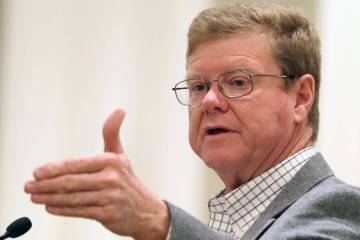Nevada regents vote to pay raises to higher ed faculty, staff
CARSON CITY — Higher education faculty and staff will get the full 3 percent raises they were promised despite the $6.4 million budget hole paying those raises will create for the state’s university system.
The Nevada System of Higher Education’s Board of Regents voted 7-5 at a special meeting Tuesday to fully fund cost of living raises for higher education faculty and classified employees. The board also voted to direct system staff and university presidents to work over the next sixth months on ways to bridge that funding gap created by the raises.
The system’s general-fund budget is $1.4 billion over the two-year biennium.
A calculating error from the Governor’s Finance Office left university workers’ raises funded at 2.4 percent, while all other state employees were funded at the full 3 percent. That error was never corrected in the budget approved by the Legislature for the next two fiscal years, leaving the system and its board with the choice of either giving smaller raises, or finding ways to cut millions from other places in the budget.
Before the vote, Regent Laura Perkins expressed concern about raising tuition or student fees to make up the difference.
“I would hope that this would not just be balanced on the backs of the students,” said Perkins, who voted for the motion.
Several university professors aired their frustrations and concerns about the what the cuts could mean, both for them and higher education in general.
“This should be considered a very embarrassing situation for this state, for this system and for this board,” UNLV history professor Gregory Brown said.
“We know only from press, from emails from colleagues, from rumors what’s going on,” Brown added. “We, like you, have personal budgets to build. We, like you, have plans we need to make. We need to know what we expect to get paid.”
Doug Unger, an English professor at UNLV and chair of the Council of Faculty Senate Chairs, told the board he’s worried about the possibility that the budget cuts will cause permanent shortfalls for universities going forward and what they could mean for both students and professors.
“This will, without a doubt, negatively affect hiring and operations to meet student needs or it will take from student tuition and fees in ways never planned for or envisioned,” Unger said.
Some regents who voted no said they were leery of spending money on the raises when that money was not allocated by the Legislature for that purpose, and worried doing so would violate state law. Some also questioned if the board should instead wait to see if there are options to get additional money from either the Board of Examiners or the Legislature’s Interim Finance Committee.
“I’m sympathetic with the position taken by the chancellor and by others that we direct our presidents to come back to us with a plan of how to fund the balance of the 3 percent COLA raise,” Regent Rick Trachok said. “My concern is I don’t know that we have the authority to do that.”
University system General Counsel Joe Reynolds disagreed with Trachok, saying that funding the raises wouldn’t violate the law because it would not put the system into debt. Reynolds added that the Interim Finance Committee would likely not be able to give any additional money out of the state’s contingency fund because state law bars using that money for state employee raises.
Chancellor Thom Reilly assured the board that the recommendations for bridging the gap would be finalized by the end of the year.
“I can assure the board we will come back in December with these recommendations,” Reilly said. “And at the time we’re submitting this we will not be in any violation, we will not be in debt in any sense of the word.”
Contact Review-Journal Capital Bureau Chief Colton Lochhead at clochhead@reviewjournal.com or 775-461-3820. Follow @ColtonLochhead on Twitter.





























